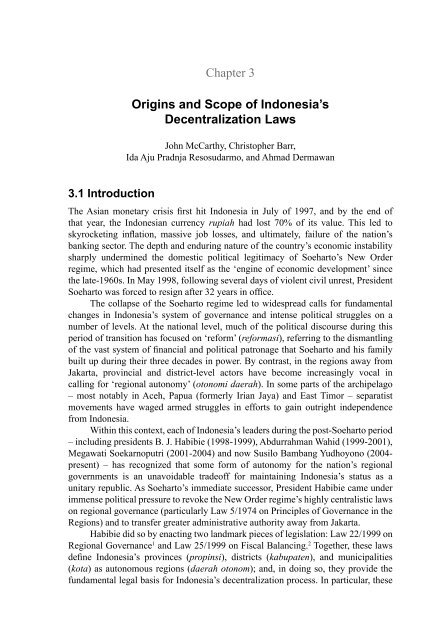Decentralization of Forest Administration in Indonesia, Implications ...
Decentralization of Forest Administration in Indonesia, Implications ...
Decentralization of Forest Administration in Indonesia, Implications ...
You also want an ePaper? Increase the reach of your titles
YUMPU automatically turns print PDFs into web optimized ePapers that Google loves.
Chapter 3<br />
Orig<strong>in</strong>s and Scope <strong>of</strong> <strong>Indonesia</strong>’s<br />
<strong>Decentralization</strong> Laws<br />
John McCarthy, Christopher Barr,<br />
Ida Aju Pradnja Resosudarmo, and Ahmad Dermawan<br />
3.1 Introduction<br />
The Asian monetary crisis first hit <strong>Indonesia</strong> <strong>in</strong> July <strong>of</strong> 1997, and by the end <strong>of</strong><br />
that year, the <strong>Indonesia</strong>n currency rupiah had lost 70% <strong>of</strong> its value. This led to<br />
skyrocket<strong>in</strong>g <strong>in</strong>flation, massive job losses, and ultimately, failure <strong>of</strong> the nation’s<br />
bank<strong>in</strong>g sector. The depth and endur<strong>in</strong>g nature <strong>of</strong> the country’s economic <strong>in</strong>stability<br />
sharply underm<strong>in</strong>ed the domestic political legitimacy <strong>of</strong> Soeharto’s New Order<br />
regime, which had presented itself as the ‘eng<strong>in</strong>e <strong>of</strong> economic development’ s<strong>in</strong>ce<br />
the late-1960s. In May 1998, follow<strong>in</strong>g several days <strong>of</strong> violent civil unrest, President<br />
Soeharto was forced to resign after 32 years <strong>in</strong> <strong>of</strong>fice.<br />
The collapse <strong>of</strong> the Soeharto regime led to widespread calls for fundamental<br />
changes <strong>in</strong> <strong>Indonesia</strong>’s system <strong>of</strong> governance and <strong>in</strong>tense political struggles on a<br />
number <strong>of</strong> levels. At the national level, much <strong>of</strong> the political discourse dur<strong>in</strong>g this<br />
period <strong>of</strong> transition has focused on ‘reform’ (reformasi), referr<strong>in</strong>g to the dismantl<strong>in</strong>g<br />
<strong>of</strong> the vast system <strong>of</strong> f<strong>in</strong>ancial and political patronage that Soeharto and his family<br />
built up dur<strong>in</strong>g their three decades <strong>in</strong> power. By contrast, <strong>in</strong> the regions away from<br />
Jakarta, prov<strong>in</strong>cial and district-level actors have become <strong>in</strong>creas<strong>in</strong>gly vocal <strong>in</strong><br />
call<strong>in</strong>g for ‘regional autonomy’ (otonomi daerah). In some parts <strong>of</strong> the archipelago<br />
– most notably <strong>in</strong> Aceh, Papua (formerly Irian Jaya) and East Timor – separatist<br />
movements have waged armed struggles <strong>in</strong> efforts to ga<strong>in</strong> outright <strong>in</strong>dependence<br />
from <strong>Indonesia</strong>.<br />
With<strong>in</strong> this context, each <strong>of</strong> <strong>Indonesia</strong>’s leaders dur<strong>in</strong>g the post-Soeharto period<br />
– <strong>in</strong>clud<strong>in</strong>g presidents B. J. Habibie (1998-1999), Abdurrahman Wahid (1999-2001),<br />
Megawati Soekarnoputri (2001-2004) and now Susilo Bambang Yudhoyono (2004-<br />
present) – has recognized that some form <strong>of</strong> autonomy for the nation’s regional<br />
governments is an unavoidable trade<strong>of</strong>f for ma<strong>in</strong>ta<strong>in</strong><strong>in</strong>g <strong>Indonesia</strong>’s status as a<br />
unitary republic. As Soeharto’s immediate successor, President Habibie came under<br />
immense political pressure to revoke the New Order regime’s highly centralistic laws<br />
on regional governance (particularly Law 5/1974 on Pr<strong>in</strong>ciples <strong>of</strong> Governance <strong>in</strong> the<br />
Regions) and to transfer greater adm<strong>in</strong>istrative authority away from Jakarta.<br />
Habibie did so by enact<strong>in</strong>g two landmark pieces <strong>of</strong> legislation: Law 22/1999 on<br />
Regional Governance 1 and Law 25/1999 on Fiscal Balanc<strong>in</strong>g. 2 Together, these laws<br />
def<strong>in</strong>e <strong>Indonesia</strong>’s prov<strong>in</strong>ces (prop<strong>in</strong>si), districts (kabupaten), and municipalities<br />
(kota) as autonomous regions (daerah otonom); and, <strong>in</strong> do<strong>in</strong>g so, they provide the<br />
fundamental legal basis for <strong>Indonesia</strong>’s decentralization process. In particular, these

















